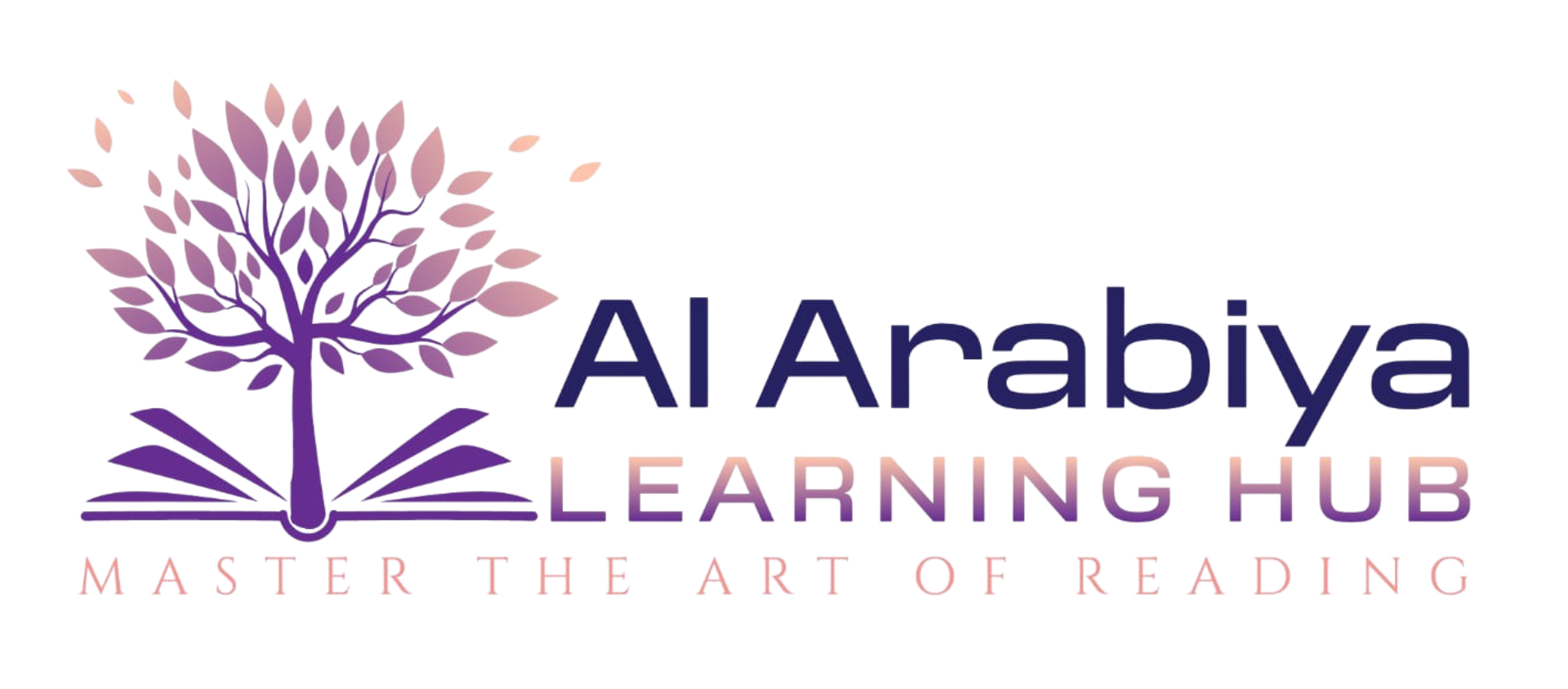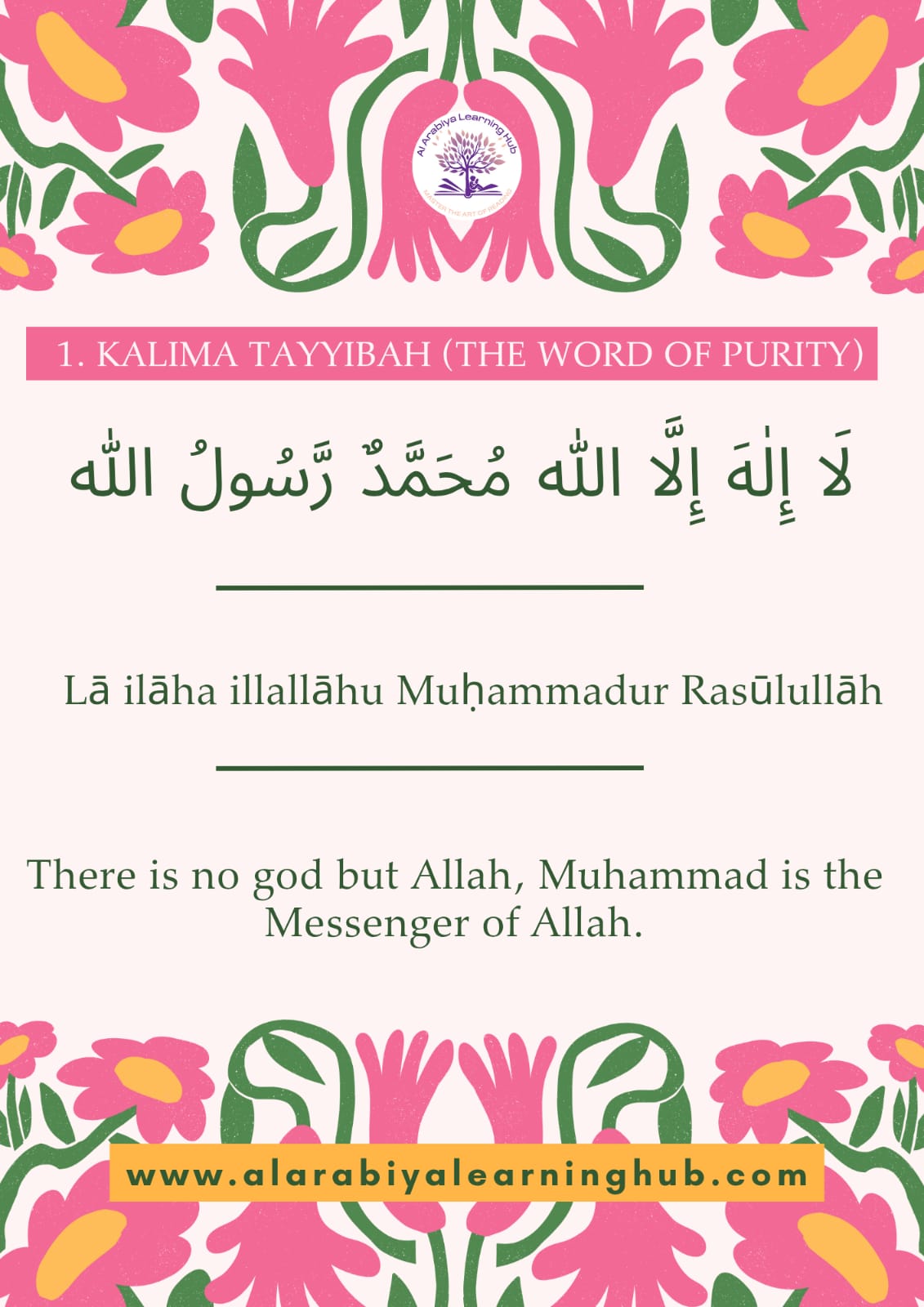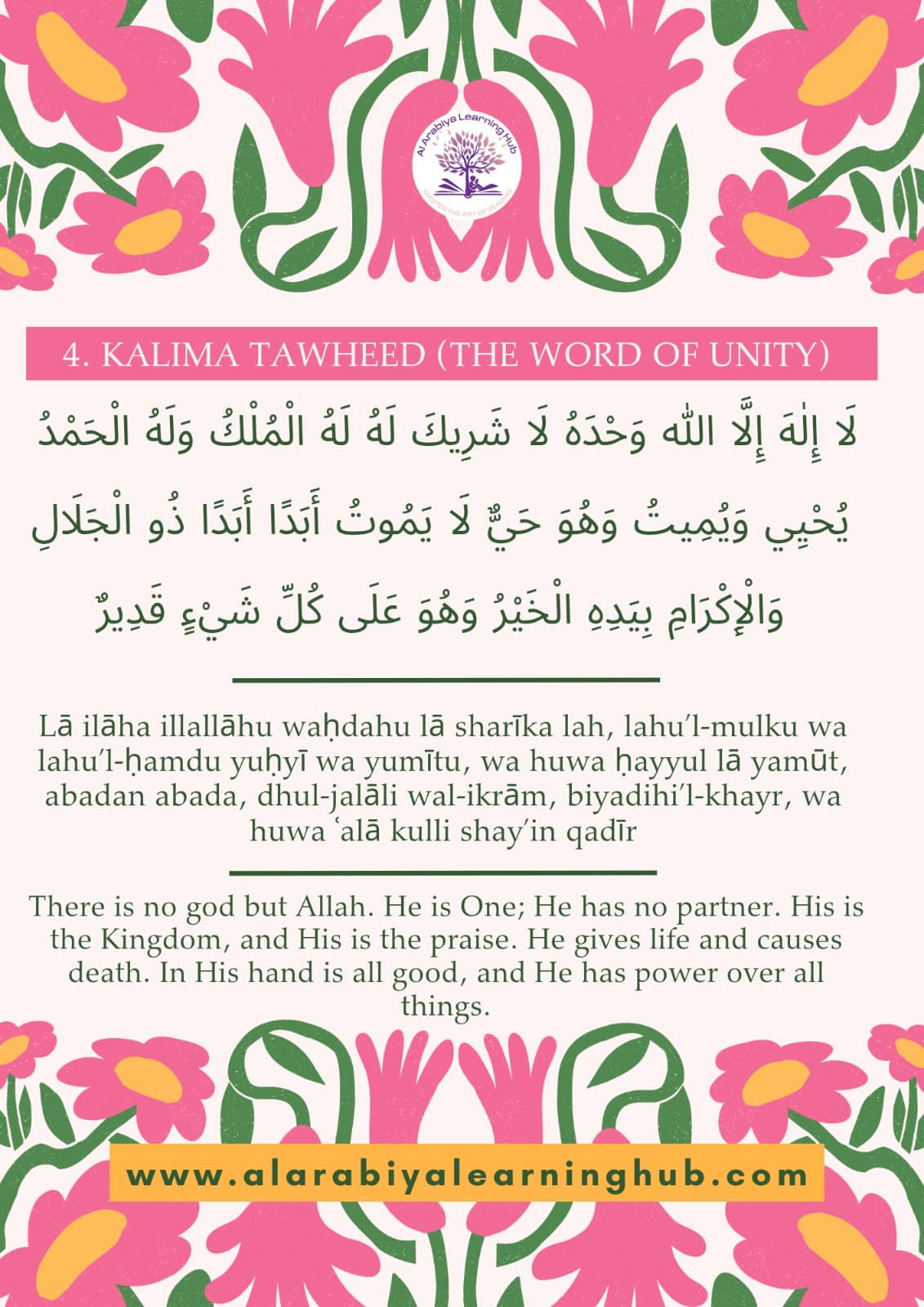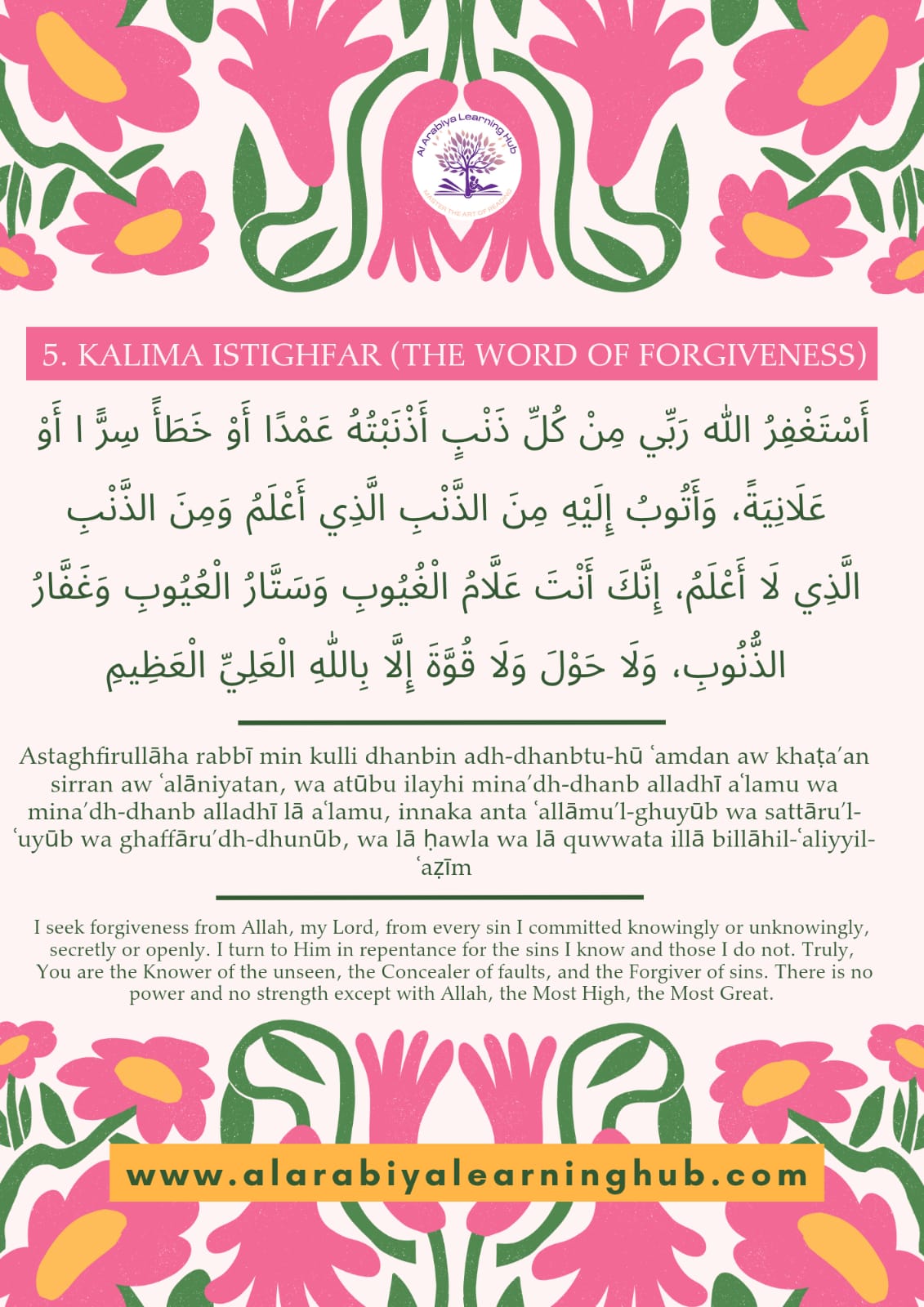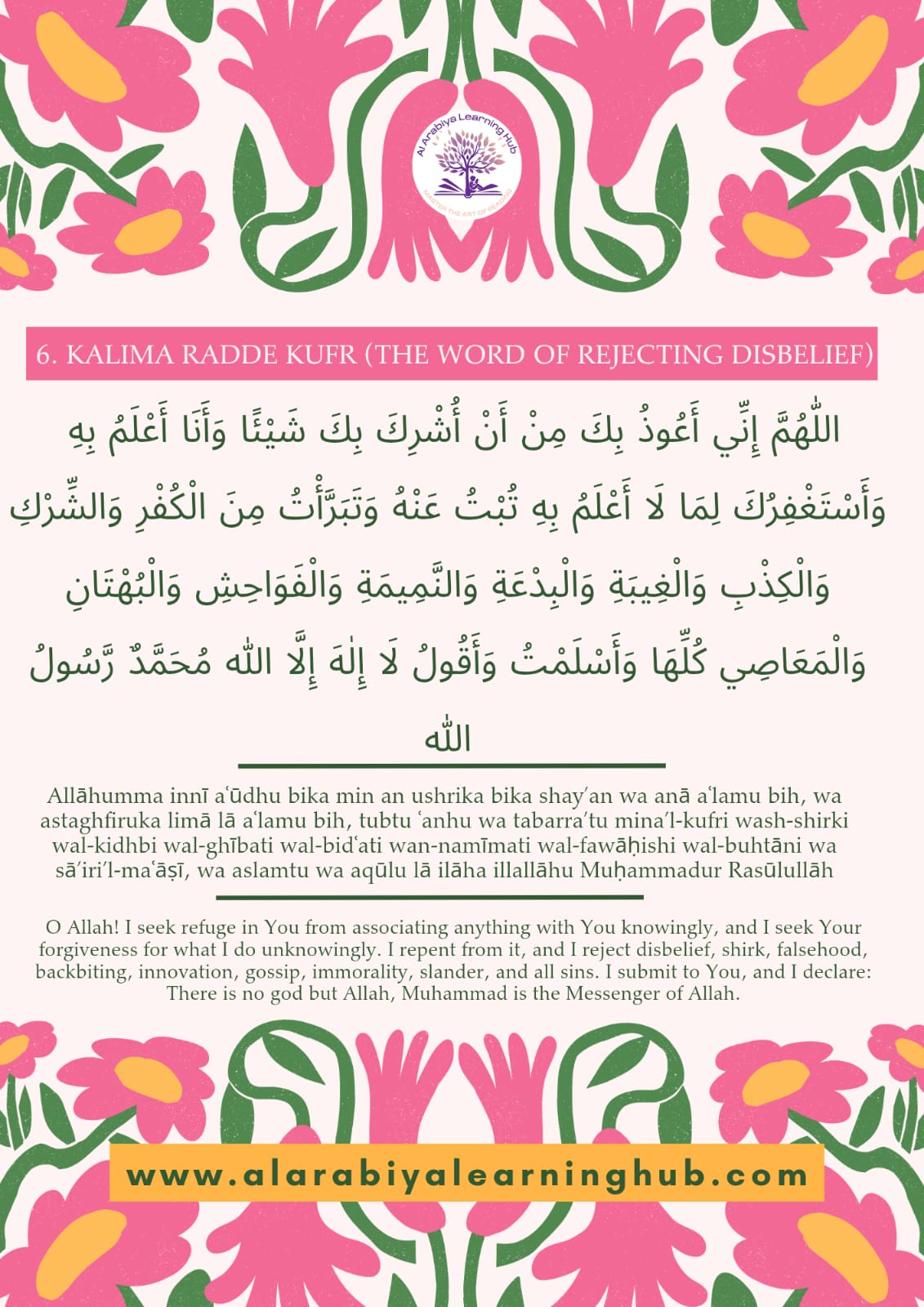The Six Kalimas (الست كلمات) are among the most beautiful summaries of our faith. They remind us of the essence of Islam — Tawheed (the Oneness of Allah), Iman (faith), and Istighfar (seeking forgiveness). Every Muslim, young or old, can find guidance, comfort, and spiritual renewal in these simple yet profound words.
🌸 What Are the Six Kalimas?
The Six Kalimas are a collection of six short statements that encapsulate key aspects of Islamic belief. They are not directly mentioned as “six kalimas” in the Qur’an or Hadith, but each of them is derived from authentic meanings found within the Qur’an and Sunnah. They have been compiled and memorised for centuries as a way to strengthen one’s faith and daily remembrance of Allah.
🕊️ 1. Kalima Tayyibah (The Word of Purity)
لَا إِلٰهَ إِلَّا اللّٰهُ مُحَمَّدٌ رَّسُولُ اللّٰهِ
“There is no god but Allah, Muhammad is the Messenger of Allah.”
This Kalima is the foundation of Islam. It declares the Oneness of Allah and affirms the finality of the Prophet Muhammad ﷺ as His Messenger.
Qur’an:
“So know that there is no deity except Allah…” (Surah Muhammad 47:19)
It is the key to entering Islam and the most beloved statement to Allah. The Prophet ﷺ said:
“The best remembrance is La ilaha illa Allah.”
(Tirmidhi)
🌿 2. Kalima Shahadah (The Testimony of Faith)
أَشْهَدُ أَنْ لَا إِلٰهَ إِلَّا اللّٰهُ وَحْدَهُ لَا شَرِيكَ لَهُ لَهُ وَأَشْهَدُ أَنَّ مُحَمَّدًا عَبْدُهُ وَرَسُولُهُ
“I bear witness that there is no god but Allah, alone, without partner, and I bear witness that Muhammad is His servant and Messenger.”
This is the declaration made when one enters Islam. It is not merely spoken, but lived — through actions, character, and devotion.
Qur’an:
“Whoever obeys Allah and the Messenger – they are with those upon whom Allah has bestowed favour.”
(Surah An-Nisa 4:69)
🌺 3. Kalima Tamjeed (The Word of Glory)
سُبْحَانَ اللّٰهِ وَالْحَمْدُ لِلّٰهِ وَلَا إِلٰهَ إِلَّا اللّٰهُ وَاللّٰهُ أَكْبَرُ وَلَا حَوْلَ وَلَا قُوَّةَ إِلَّا بِاللّٰهِ الْعَلِيِّ الْعَظِيمِ
“Glory be to Allah, all praise be to Allah, there is no god but Allah, Allah is the Greatest. There is no power and no strength except with Allah, the Most High, the Most Great.”
This Kalima is a beautiful form of dhikr (remembrance) that brings peace to the heart and forgiveness of sins.
Hadith:
“Two words are light on the tongue but heavy on the scale and beloved to the Most Merciful: SubhanAllahi wa bihamdihi, SubhanAllahi al-‘Azim.”
(Bukhari & Muslim)
🌼 4. Kalima Tawheed (The Word of Unity)
لَا إِلٰهَ إِلَّا اللّٰهُ وَحْدَهُ لَا شَرِيكَ لَهُ لَهُ الْمُلْكُ وَلَهُ الْحَمْدُ يُحْيِي وَيُمِيتُ وَهُوَ حَيٌّ لَا يَمُوتُ أَبَدًا أَبَدًا ذُو الْجَلَالِ وَالْإِكْرَامِ بِيَدِهِ الْخَيْرُ وَهُوَ عَلَى كُلِّ شَيْءٍ قَدِيرٌ
“There is no god but Allah. He is One; He has no partner. His is the Kingdom, and His is the praise. He gives life and causes death. In His hand is all good, and He has power over all things.”
This Kalima expresses the absolute Oneness and sovereignty of Allah — a reminder that all power, life, and goodness come from Him alone.
Qur’an:
“He is Allah, the One. Allah, the Eternal Refuge. He neither begets nor is born, nor is there to Him any equivalent.”
(Surah Al-Ikhlas 112:1–4)
🌙 5. Kalima Istighfar (The Word of Forgiveness)
أَسْتَغْفِرُ اللّٰهَ رَبِّي مِنْ كُلِّ ذَنْبٍ أَذْنَبْتُهُ عَمَدًا أَوْ خَطَأً سِرًّا أَوْ عَلَانِيَةً وَأَتُوبُ إِلَيْهِ مِنَ الذَّنْبِ الَّذِي أَعْلَمُ وَمِنَ الذَّنْبِ الَّذِي لَا أَعْلَمُ إِنَّكَ أَنْتَ عَلَّامُ الْغُيُوبِ وَسَتَّارُ الْعُيُوبِ وَغَفَّارُ الذُّنُوبِ وَلَا حَوْلَ وَلَا قُوَّةَ إِلَّا بِاللّٰهِ الْعَلِيِّ الْعَظِيمِ
“I seek forgiveness from Allah, my Lord, from every sin I committed knowingly or unknowingly, secretly or openly. I turn to Him in repentance for the sins I know and those I do not. Truly, You are the Knower of the unseen, the Concealer of faults, and the Forgiver of sins. There is no power and no strength except with Allah, the Most High, the Most Great.”
This Kalima teaches humility and repentance. Seeking forgiveness purifies the heart and brings one closer to Allah.
Qur’an:
“And whoever does wrong or wrongs himself but then seeks forgiveness of Allah will find Allah Forgiving and Merciful.”
(Surah An-Nisa 4:110)
🌷 6. Kalima Radde Kufr (The Word of Rejecting Disbelief)
اللّٰهُمَّ إِنِّي أَعُوذُ بِكَ مِنْ أَنْ أُشْرِكَ بِكَ شَيْئًا وَأَنَا أَعْلَمُ بِهِ وَأَسْتَغْفِرُكَ لِمَا لَا أَعْلَمُ بِهِ تُبْتُ عَنْهُ وَتَبَرَّأْتُ مِنَ الْكُفْرِ وَالشِّرْكِ وَالْكِذْبِ وَالْغِيبَةِ وَالْبِدْعَةِ وَالنَّمِيمَةِ وَالْفَوَاحِشِ وَالْبُهْتَانِ وَالْمَعَاصِي كُلِّهَا وَأَسْلَمْتُ وَأَقُولُ لَا إِلٰهَ إِلَّا اللّٰهُ مُحَمَّدٌ رَّسُولُ اللّٰهِ
“O Allah! I seek refuge in You from associating anything with You knowingly, and I seek Your forgiveness for what I do unknowingly. I repent from it, and I reject disbelief, shirk, falsehood, backbiting, innovation, gossip, immorality, slander, and all sins. I submit to You, and I declare: There is no god but Allah, Muhammad is the Messenger of Allah.”
This Kalima renews one’s commitment to Islam and rejection of all forms of disbelief, hypocrisy, and sin. It’s a reminder that a believer’s heart belongs only to Allah.
💫 How to Incorporate the Six Kalimas in Daily Life
- 🌸 Recite one Kalima daily during your morning or evening dhikr.
- 🌙 Teach them to your children — these are their first steps into loving and understanding Islam.
- 🕋 Reflect on their meanings rather than only memorising the words.
- 🌿 Use them in du’a — as expressions of faith, gratitude, and repentance.
🌻 Final Reflection
The Six Kalimas are more than words — they are a path to spiritual awareness, connecting our hearts to Allah and reminding us of our purpose. In times of hardship or ease, their meanings bring peace and guidance.
“Those who believe and whose hearts find comfort in the remembrance of Allah — indeed, in the remembrance of Allah do hearts find rest.”
(Surah Ar-Ra’d 13:28)
